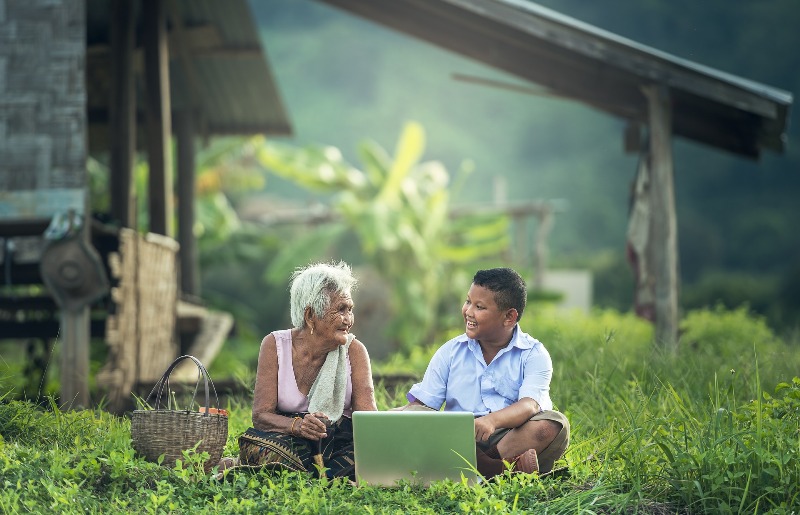
I’m a part of the generation that talks about self-care on a daily basis. If not explicitly, we are subconsciously marketed the concept of “self-care” every single day. Whether we are encouraged to escape the world by binging the latest series on Netflix or to cancel plans after a long day in favor of a bath featuring a recently acquired bath bomb, we are constantly promised new ways to retreat from the messy world. Nooks and crannies of solitude featuring lavish “treat yourself” novelties promise temporary respite from a broken and chaotic world.
And before I go any further, I do believe that we often require retreats to recuperate from the overwhelming world. It would be naïve to say there isn’t any truth in the need to gather yourself up to face another day. And taking care of yourself is one of the most important things you’ll ever have to do – you are a child of God that deserves to be taken care of well, especially by yourself.
But I do think that in the name of self-care we have exacerbated an endemic loneliness. We’ve adopted a “haters gonna hate” and a “you do you” kind of attitude that guides our decision-making processes. We’ve moved to a cultural mindset that frees us from our social obligations to focus more on ourselves. We feel more free to excuse ourselves from the hard work of relationship building because those interactions don’t seem to serve us in the short term. And while freedom is absolutely essential to health and growth, that pursuit towards individuality can distract us from the equally necessary pursuit of those around us.
Self-care vs community
We are a world starving for community. In an age of technological conveniences that grant respite from an overwhelming world, it is so easy to go home at the end of the day and retreat from it all. And sometimes there are seasons where all you can do is be proud that you’ve survived another eight hours. But I’m finding that there is a difference between solitude and the convenenience of not putting in the hard work and vulnerability required for friendship.
Falling into a “you do you” kind of philosophy hinders our ability to dig deeply into relationships that ultimately help shield us from our own brokenness as well as the broken and hurting world around us.
Now, you might not think that this mindset has affected you or that these silly phrases don’t make a huge difference. But I think that the words we say – especially to ourselves – matter. A lot. And that when we say that we don’t care about anyone’s words, when we say that our opinion matters over everyone else’s, when our plans and comfort continually matter more than anyone else’s – we are conditioning ourselves to care a little less about the people around us. And it’s awfully hard to build community with people that we don’t care about.
Self-care can turn into a lie that tells us there aren’t others around us that will be able to – or want to – take care of us as well as we can take care of ourselves. And, of course, there is risk involved in letting other people care for us; many of us have very real wounds from relationships. But I’ve found that my own attempted retreats from the broken world leave me feeling a little more broken still. And the more that I indulge in solitary self-care, the less I am pressing into the challenging, sacrificial self-care that looks like community building.
As I was reminded the other day, we get better at what we practice. And when we constantly practice not caring about other people and their opinions, than we start getting really good at being lonely.
Made for relationships
I think that we need to care a bit more about other people, not a bit less. We are created by a relational God for relationships with Him and with others, and you can’t build a society out of people that don’t care. The Bible reminds us again and again that we are meant to live in this challenging world with other people. In Hebrews chapter 10, verses 24-25 it says, “And let us consider how we may spur one another on toward love and good deeds, not giving up meeting together… but encouraging one another.”
Society is built on relationships and those relationships have to start with a mutual depth of care that encourages you through the hardships and brokenness of those same relationships. The first step begins with us allowing ourselves to care for other people and to allow ourselves to be cared for by those same people. Paradoxically, it is these relationships with other broken people that often offer us the greatest healing from the broken world around us.
I’m finding that I need to stop being so much about “me doing me” and more about “me pressing into relationships.” Because community isn’t built from nights in with Netflix. It is built from tired, grumpy, and broken people coming together to share and help each other through life that constantly convinces us that we are unworthy of that kind of love. It is a dance of giving and receiving in a society that convinces us of lack at every turn. And yet, it is a necessary weapon against the broken loneliness of ourselves and the world.
 Rebecca constantly strives to practically love people around her; she also loves fuzzy socks, her five sisters, pink and orange alstroemerias, calligraphy, and sour gummy worms.
Rebecca constantly strives to practically love people around her; she also loves fuzzy socks, her five sisters, pink and orange alstroemerias, calligraphy, and sour gummy worms.

Rebecca constantly strives to practically love people around her. She also loves fuzzy socks, her five sisters, pink and orange alstroemerias, calligraphy, and sour gummy worms.